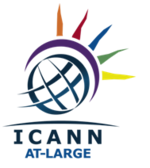AFRALO
| Industry: | Internet governance |
| Website: | AFRALO Community Page |
The African Regional At-Large Organization (AFRALO) is one of the five RALOs that make up the ALAC constituency within ICANN. It provides news, resources, and information for individuals and end-user groups in the African region who are interested in ICANN.[1]
AFRALO Board
Current AFRALO Executive Team[2] below; previous boards can be found here:
| Position | Name | ALS/Location | Term | Comments |
|---|---|---|---|---|
| Chairperson | Seun Ojedeji | Open Source Foundation for Nigeria (OSFON) | 2021 AGM-2023 AGM 2019 AGM-2021 AGM |
Elected |
| Vice-Chairperson | Aziz Hilali | ISOC Morocco | 2021 AGM-2023 AGM 2019 AGM -2021 AGM |
Elected |
| Secretariat | Abdeldjalil Bachar Bong | House of Africa | 2020 AGM-2022 AGM | Elected |
| ALAC member | Dave Kissoondoyal | 2021 AGM- 2023 AGM 2019 AGM - 2021 AGM |
||
| ALAC member | Sarah Kiden | 2020 AGM - 2022 AGM 2022 AGM- 2024 AGM |
||
| ALAC member (NomCom selected) | Raymond Selorm Mamattah | 2021 AGM - 2023 AGM | ||
| NomCom Delegate | Tijani Ben Jemaa | 2021 AGM - 2022 AGM |
ICANN 42
In 2009, an AFRALO Working Group created a document that outlined the capacity-building needs of AFRALO to inform and educate its representatives on ICANN activities and to establish a communication policy well-suited for the African region.[3]
AFRALO held a series of capacity-building sessions at ICANN 42 in Dakar, Senegal in October 2011. More than 20 representatives from each of the African At-Large Structure joined the meetings, which had about 300 people in attendance. The five-day program, conducted by ICANN officers and staff, aimed to provide ALS representatives with briefs on key policies, issues, and facets of ICANN.
According to AFRALO's own metrics, the participation of ALS representatives increased by 30 percent in the two months following the conference. The organization also expects this participation level to extend to the At-Large policy development process and in At-Large Working Groups.[3]
ICANN 76
AFRALO and the African ICANN community discussed best practices for DNS operations in Africa, including:[4]
- Reinforcing the use of Anycast, which routes to the nearest server, instead of relying on a single server.
- Offering incentives to DNS operators to accelerate the implementation of DNSSEC, which enhances DNS security by digitally signing DNS records and prevents man-in-the-middle attacks and DNS Spoofing.
- Partnering with local stakeholders so that DNS services are adapted to the regionally specific needs.
- Collaborating with local Internet Service Providers to guarantee DNS services are well-connected to the local Internet infrastructure.
- Strengthening ccTLD development in Africa to build technical capacity by providing technical assistance and support.
- Enhancing local cooperation with CERTs
See also
References
- ↑ AFRALO
- ↑ AFRALO Regional Officers, Community.ICANN.org
- ↑ 3.0 3.1 ICANN POLICY UPDATE | Volume 12, Issue 1 — January 2012, ICANN.org. Published 1 January 2012. Retrieved 27 November 2012.
- ↑ ICANN76 Policy Outcomes Report, pg30
